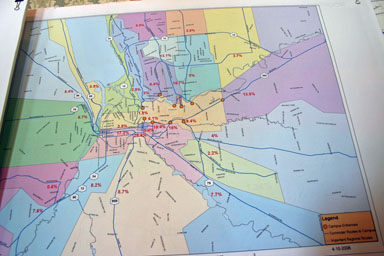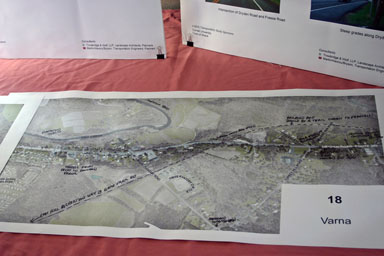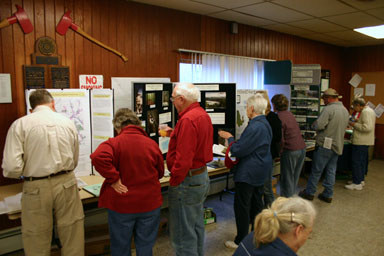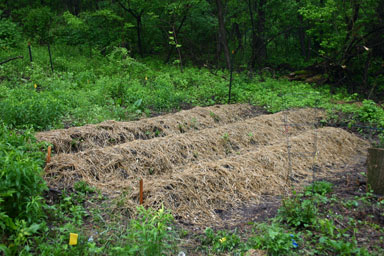May 1, 2006
Natural features, transportation meetings
With all the gardening, I'm a little behind on posting here. Saturday's Journal had an article on forums to discuss the future of natural features focus areas in Tompkins County. The Town of Dryden includes pieces of 8 of the 15 areas. There will be a meeting May 23rd from 7:00pm to 8:30pm at the McLean Fire Hall asking citizens for conservation ideas, as well as earlier meetings in Lansing and at the Tompkins County Public Library. Town of Dryden Environmental Planner Dan Kwasnowski talked about approaches they hope to hear about:
Kwasnowski was quick to point out that these tools do not necessarily mean more regulations. While regulations may be one suggestion, there are many voluntary tools and other options that can be used.
The outreach component inherent in these meetings is also important to organizers. They're hoping to raise awareness for landowners or users who weren't aware of some of the unique features of the areas they frequent.
Briefly in Tompkins mentioned a public meeting "to gather community input on current construction projects at Cornell University and campus traffic patterns." I understand that this is an open session, not a 4-hour sit down, and that it's feeding into the larger Cornell traffic studies, not just this year's projects. There will be a meeting at the Best Western University Inn at East Hill Plaza on May 3rd from 4:00pm to 8:00pm.
The county mailed re-assessment letters Friday. I haven't seen one in my mailbox, but one may yet arrive.
This morning's Journal includes what looks like a new feature, Follow File, which reports on the Dryden Lake Golf Course's new owners, Randy and Joanie Luberecki.
Skatepark demonstration
I couldn't make it over to Montgomery Park on Saturday, but Mary Ann Sumner did, and she sent these pictures of kids enjoying themselves on the equipment.




From what I've heard at Town Board meetings, it's not yet clear how a more permanent skatepark might come to be, but the Ackley family is working hard to make one happen. It looks like Saturday was a fun step forward toward that.
Oil prices and Dryden
I've written a few times about what impact rising gas prices might have on Dryden, but it looks like we're now going to be getting used to $3.00 gas that was just speculation two years ago. Energy Secretary Sam Bodman thinks this will last about three years, "before suppliers are going to be in a position to meet the demands of those who are consuming this product."
I'm not sure where those extra supplies of oil are going to come from, when there haven't been a lot of exciting discoveries and demand for oil is increasing all over the world. It seems likely that prices are going to keep climbing, unless people suddenly start using a lot less of the stuff. (Three years is also a convenient prediction, as it can't be evaluated until we're past the next presidential election cycle.)
It seems like it's time to start thinking about what we can do locally. Drilling for oil here isn't likely to work - Dryden seems to be a bit east of the natural gas deposits in the Finger Lakes, and well east of New York's few oil wells near Olean. It's a prime time to consider generating power with wind and solar technologies, even if the Town Attorney considers them a fad.
It may be time, though, to start looking at what increased oil and gas prices will mean for development here generally. Dryden is going to be less attractive for people driving to Ithaca or Cortland - though it may become more attractive to people already driving to Ithaca from Cortland or vice-versa. Highway Superintendent Jack Bush has definitely noticed the price of asphalt climbing - are we willing to pay for the asphalt to pave the roads the way we've been used to? The town will be re-examining zoning as part of the implementation of the Comprehensive Plan, and it might be wise to factor higher transportation costs into those decisions.
I know there isn't much the Town can do about high gas prices, but I suspect this shift may produce the largest issues Dryden's faced in a long while, changing real estate values, business prospects, and tolerance for taxation as costs go up for both taxpayers and the government.
(And no, I don't think blaming the oil companies will get us very far. Even if they were operating as non-profits, something I'd enjoy seeing though it's unlikely, the basic problem seems to be too little supply for too much demand. A serious and permanent reduction in price will require either a lot more supply or a lot less demand.)
May 2, 2006
Dryden school budget up 7.39%
The print edition of today's Ithaca Journal has a summary of the Dryden Central Schools budget. It's a little strange - the subhead says "Faculty Cuts Keep Levy Under Target" - but the box doesn't actually list the tax levy change, saying only that the rate is not yet set. The budget cuts 9.8 staff and faculty teachers, and rebuilds the district's capital reserve fund, which was hit by higher fuel and staff costs last year. The budget has increased 7.39%, and state aid, which is close to 50% of the budget, increased 6.09%.
There's a Dryden DWI in the Monitor.
On the opinion page, former Dryden County Legislator Mike Lane teams with fellow former Legislator Peter Penniman to urge the end of the density policy for subsidizing development in downtown Ithaca:
It is wrong for the Density Policy to provide incentives for a project in one municipality at the expense of one in another. While downtown Ithaca is an historic commercial area, it is only one of many in the county. In 2000, downtown was hurting and needed help. Since then, promoters of the Downtown Business District have done a great job of revitalizing the area. It simply doesn't need additional specialized tax abatements to keep it healthy....
It is time to level the playing field. The Density Policy should be completely rescinded, and the IDA should return to granting tax abatements only for the production and preservation of more good paying local jobs, something that is still very much needed in this county.
If you're curious where the state budget ended up, Jay Gallagher offers a report on what remains to be settled in state spending for the next year.
May 3, 2006
Tourism grants support Dairy Day
This morning's Ithaca Journal reports that Dryden Dairy Day will be among the beneficiaries of Community Celebration Grants approved by the County Legislature.
Boehlert on energy policy
In yesterday's Binghamton Press & Sun-Bulletin, retiring Congressman Sherwood Boehlert had a guest column looking at problems in American energy policy:
We need to move now on two related fronts. We need to reduce or at least limit U.S. demand for oil as quickly as possible, and we need to develop new technologies that can further help address our addiction to oil in the future.
It's crystal clear where we need to start on the demand side. The U.S. uses most of its oil for transportation. We can limit U.S. demand for oil by requiring automakers to use the technology that already exists to improve fuel economy -- technology that the automakers refuse to bring into the market despite societal demand.
That is a classic market failure that the government ought to address. The National Academy of Sciences has made clear that mileage can be increased significantly with current technologies and without reducing safety.
We ought to take the same kinds of steps to require appliances and buildings to be more energy efficient. That won't do much for gas prices -- little oil is used to generate electricity -- but it will help our nation become more energy secure overall.
And then we need to invest more in coming up with new technologies that can move us away from our dependence on gasoline. Three obvious areas that require more investment are plug-in hybrids, biofuels and hydrogen. Our House Science Committee will be reviewing ideas on how to increase our investment in those areas, and we expect to move legislation swiftly.
I think Boehlert's right on about our need to reduce demand for energy. I have my doubts that the new technologies he proposes actually help us much in the long term even if they do move us further from gasoline specifically, but improving efficiency certainly offers another opportunity to reduce the amount of energy we consume.
(Plug-in hybrids shift our consumption from gasoline to coal, natural gas, and other electricity-generating systems. Biofuels sound great, except that you have to add fossil-fuel-based fertilizers to the land to generate the kinds of yield we need for commerical creation of fuel. Hydrogen - well, it takes lots of energy once again to create the hydrogen, and transporting it will requiring building a whole new pipeline and distribution infrastructure to extremely high standards. These can all shift our energy needs from one form to another, giving us a little more flexibility, but none of them reduces the energy we're actually consuming.)
May 4, 2006
Schools test better; wildfire risk
This morning's Ithaca Journal visits local school districts, whose test scores have been improving, and talks with Dryden Superintendent Mark Crawford about trends in the schools.
There's also an article about recent dry weather leading to wildfires. It might rain this afternoon, but it sure doesn't look like it now.
Finally, retiring Congressman Sherwood Boehlert's advice on nanotechnology is the focus of the editorial.
May 5, 2006
Waiting for wind
Last week I stopped in to talk with Carol Schmook and Ken Jupiter, whose plans to put a 10 kW windmill on their property at the corner of Baker Hill Road and Mount Pleasant Road came to a sudden halt at last month's Zoning Board of Appeals meeting. NYSERDA, the state authority that provides funding for solar and wind installations, requires a building permit for their projects, which required a zoning variance, which led to the conclusion that the Zoning Board can't presently issue such a variance until the Town Board passes a law.
While the Town Board ponders an alternative energy ordinance (which the Town Attorney apparently dislikes for non-legal reasons), these folks, who've paid a $6000 deposit to Renovus Energy, are stuck.
Renovus does warn on their site that:
unless you are prepared to be very patient waiting for permits and approvals for your wind turbine, don't even think about contacting us. It will only end up being a waste of your time and ours. To date, our experience has been waiting periods of between 6 months to one year from signed Purchase Agreement to an installed, grid-connected, operating wind turbine.
Obtaining the necessary permits from "authorities having jurisdiction" (AJHs) will be the most time-consuming and frustrating step in the process of design, permitting, installation, commissioning and ongoing maintenance of a small wind project. AHJs include: local planning and zoning boards, local building department and code enforcement office, electric utility, NYSERDA project reviewers (NYS SEQR requirements) and possibly others.
Even with that warning, though, I think everyone was surprised to find that Dryden currently has no mechanism at all for approving these, especially given that windmills are already operating at a few places in the town.
They want to put the windmill on a tower in this forested area, over 150 feet from anything else.
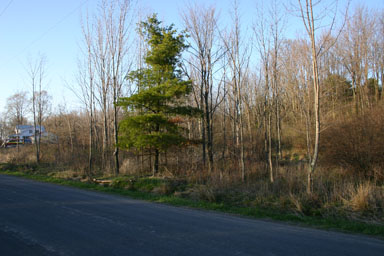
Prospective site for a small windmill.
The windmill would be a Bergey Excel, a common turbine for residential use that can produce 10 kW when there's 29 mph of wind. They shared the technical data with me, including a noise test report (203KB PDF), information on its (lack of) impact on birds (52KB PDF), and a letter from Audubon Society of California supporting the use of small-scale windmills (50KB PDF).
Renovus also has a set of pictures of local wind installations in various places that provide some idea what these look like. This windmill would use net metering, feeding power back into the grid when it generates more than the house itself uses. Given the seasonal nature of wind, it will likely feed as much power to the grid as the house uses from the grid during off-seasons. Break-even for the project is estimated at 15 years.
Schmoock and Jupiter seem willing to wait, if frustrated by the delay. They described the windmill as:
fitting well with retirement. We can't avoid property taxes, but can avoid electrical bills. We would like to stay and keep paying taxes.
They had been hoping to put up the windmill this summer, to take advantage of fall's higher winds, and have been sending letters to neighbors explaining their plans (59KB PDF) along with an approval letter to Renovus (56KB PDF) that they need to collect from their neighbors in order to proceed with NYSERDA. So far, all of their neighbors but one have sent approvals.
I'll admit that this all seems strange to me. Putting up towers of any kind seems like an activity that the Town should regulate, but currently telecommunications towers are heavily regulated while ham radio towers aren't regulated at all. These windmills aren't the schoolbus-on-a-stick giants that generated so much resistance for Cornell last year, but much smaller devices that aren't nearly as visible. The town's known of windmills going up earlier in other places, but suddenly it's become a problem.
Hopefully the town will move quickly on this.
Water tasting, school volunteers
The Ithaca Journal's editorial today visits the Tompkins County Water Week and Taste Test, exploring the importance of water supplies to this area. (I was contemplating that yesterday while watching thunderstorms go north of us on the radar.)
There's also a letter from Erica Evans about the help volunteers provide to local schools.
Tick warning
I don't normally use my own medical adventures for this site, but today seems like a worthy exception.
It's apparently an excellent year for ticks.
I removed a tick from my dog Spring a couple of weeks ago, and was horrified this morning to find I had a tick on my chest, apparently feasting. Worse, it looked to be a deer tick, the kind that carries Lyme Disease. I attempted to get it to retreat by smothering it in Vaseline, but apparently it just died.
So, off I went to the Cayuga Medical Center's Convenient Care...
(Note: Picture in the extended entry - no need to scare people on the main page.)
where they removed the tick and gave me instructions (113KB PDF) and a prescription for Doxycycline, just in case the tick had in fact given me Lyme Disease. They don't think it likely, as the tick hadn't been on there very long, but just in case, I took the stuff. I was apparently the second tick removal of the morning.

Unwelcome visitor - a deer tick.
I guess the mild winter may have given ticks a boost. I strongly encourage anyone working in tall grass or forest edges to watch closely for these things, as the removal process, though the doctor seemed great, wasn't exactly pleasant. (Novocaine helped, but the shot itself wasn't fun, and it doesn't feel great now.)
May 6, 2006
Methodists send laurel for bone marrow help
This morning's Ithaca Journal is pretty quiet on Dryden news. In Dart & Laurels, there's this:
LAUREL: From the Dryden United Methodist Church to the Dryden community for its support of the recent bone marrow drive. The tremendous support we received made it possible for our little town to have one of the most successful drives in Central New York. A big thank you goes to the Dryden school district, area businesses, churches and many individuals that supported the drive including: George B. Bailey Agency Inc., Clark's Shurfine Foods, Cotterill Agency, Crown Construction, Dryden Agway, Dryden First National Bank, Freeville United Methodist and Groton Assembly of God which donated the use of their vans for transporting students to the drive.
There's also an article on Assemblywoman Barbara Lifton's efforts to help daycare providers.
Cornell t-GEIS event
I went to the Cornell transportation impact project meeting Wednesday night, hoping to get a better idea of what this joint project between Cornell University and the Town of Ithaca might mean for Dryden. (Dryden is participating, but isn't the project lead.) They're creating a transportation generic environmental impact statement (t-GEIS) that will look at transportation, especially traffic shifts, to come over the next ten years, and ways to handle their impact.
I found some rather large surprises in the data amidst the requests for input. Only 21% of Cornell faculty, staff, and graduate students live in the City of Ithaca. 24% live in the Town of Ithaca, 36% in Tompkins County outside of Ithaca, and 19% live outside the county. 13.5% of Cornell commuters appear to be driving past my house on Route 366 every morning and evening.
In addition to having people explaining the scope of the project and taking comments, the displays combined explanations of the kinds of things they were looking at with maps and photos for specific areas. There were markers around so you could annotate the maps, which I did on the Varna map:
I've posted a gallery of photos of the event, and hopefully they're clear enough to read and provide a sense of what they're looking at. The web site for the project includes Frequently Asked Questions as well as a scope document (1802KB PDF with figures 278KB without.
This study could have a huge impact on western Dryden - especially Varna but also Bethel Grove, Ellis Hollow, and Hanshaw Road - so it's definitely worth keeping a close watch.
A legal perspective on windmills
Last week, I published Town Attorney Mahlon Perkins' opinion on windmills. It turns out that the attorney for the Zoning Board of Appeals, Randy Marcus, also wrote a letter to the Town Board on the subject (110KB PDF, 156KB selectable).
Marcus' opinion, unlike Perkins', is a legal opinion. Marcus doesn't question whether or not windmills are a good thing - he looks at the current state of Dryden zoning law and tells the town that they should act to avoid legal challenges:
I could imagine a situation in which a residential property owner attempts to install a wind turbine and catagorize it as an accessory structure to their home (rather than as a public utility, as last week’s applicant proposed). In this situation, I believe the property owner would have a strong argument in support of being treated comparably to a property owner seeking to install a garage or a shed.
If the Town adopted an ordinance that specificalIy permitted and regulated structures such as wind turbines, the Town would have a much better opportunity to control the development of such stmctures; and limit their locations, size, and other features. Therefore, I believe it to be in the Town’s best interest to act on adoption of legislation of this sort in the earliest possible time frame. By doing so, the Town may avoid challenges, and possibly successful challenges, at considerable expense to the Town, by applicants interested in developing wind turbines to serve their individual residences.
It's good to see someone providing the Town with clear legal advice on a potentially difficult area.
Planting into the forest edge
My yard is surrounded on three sides by trees. Two of those edges are narrow strips of forest that separate me from neighbors, while the area in the back is many acres of forest. Last week, after stopping by 4-H Acres to pick up my order from the Tompkins County Soil and Water Conservation District, we worked on cutting into one of those forest edges to plant some more useful plants than the box elders and vines that had been there.
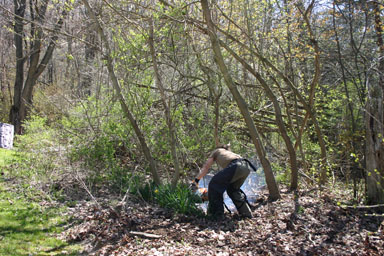
Clearing a space into the forest edge.
Josh started by cutting down a few of the box elders, creating more of a space in the forest. Next we planted three American Plums, two Witch Hazels, three White Birches (all of the above from TCSWCD), two red currants, two white currants, and two elderberries. (We found some wild gooseberries already in the forest.) Afterward we raked and mulched with straw.
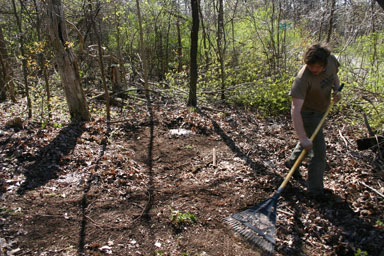
Raking forest floor mulch after planting.
Using forest edges is an experiment here, though one that's worked in other gardens.
Also, while digging, I came across the top of a pipe in the ground. I'm not sure what it used to be.
I've posted a gallery of photos from that day if you'd like to see more.
May 8, 2006
Animal rescue film Friday
This morning's Briefly in Tompkins mentions a showing of the film The Witness at the Tompkins County SPCA on Hanshaw Road this Friday at 7:30pm. Tickets are $5.00.
The Journal also reports some local DWIs, and the March and April health reports include some Dryden businesses and activities.
On the opinion page, there's another look at affordable housing issues in Tompkins County, and former Ithaca School Board member Henry Kramer endorses Allen Lambert for the board.
Better Housing meeting Tuesday evening in Etna
Better Housing for Tompkins County will be having a meeting Tuesday night at Houtz Hall in Etna (map) from 6:00pm to 7:30pm. One of the organizers, Abi Munro, wrote a description of what will be talked about for the Ithaca Journal.
I'm hoping to be there, and hope to see a lot of other people too.
May 9, 2006
Ellis Hollow, Pinckney Road infrastructure
The Town Board will soon be evaluating the prospects for a water district along Ellis Hollow Road (where wells have been having problems) and for a water and sewer district near Pinckney Road, where it would serve businesses between there and Hall Road.
The Ellis Hollow one is probably the one that will cause the most discussion, as it affects many more people, and includes two options for a 'base area' and an 'extended area', requiring the town to consider how large a district they want. For that report, you can read:
- Interim Engineer's Report (86KB PDF)
- Map of the base area, using the Hungerford Hill and East Hill tanks (217KB PDF)
- Map of the base area, using the NYSEG tanks (273KB PDF)
- Map of the extended area, using the NYSEG tanks (275KB PDF)
There are also reports for Pinckney Road's possible water and sewer districts:
- Pinckney Road Water District Engineer's Report (157KB PDF)
- Water District Map (55KB PDF)
- Pinckney Road Sewer District Engineer's Report (138KB PDF)
- Sewer District Map (76KB PDF)
There are also two maps showing current water (1413KB PDF) and sewer (1303KB PDF) service in the Town.
Law-making in Dryden
On the Dryden Democrats weblog, Town Board member Mary Ann Sumner has a piece on how a draft becomes a law, looking over the process of how the town passes new laws.
She's also written on Natural Features Focus Areas, and Tax Assessment Review. It's well worth a visit!
May 10, 2006
Poetry in middle school, bike rodeo
In this morning's Dryden Town Talk Cathy Wakeman visits Dryden Middle School's "Poem in Your Pocket" event, and writes about Saturday's Sertoma Bicycle Rodeo, which will be held from 9:00am to 11:00am on Saturday, with a rain date of May 20th.
Briefly in Dryden - in the print edition only - notes a Parent Information Night to be held Monday, May 15th in room C-13 of Dryden Middle School. The PTO will be discussing Internet safety. There's also mention of Better Housing workshops, one at McLean Community Church on May 18th and one at Dryden Town Hall on May 25th. Both will be from 6:00pm to 7:30pm. Also, the Town of Dryden Highway Department will be collecting scrap metal at their garage (map).
The opinion page focuses on the Ithaca school board races. The only Dryden-specific letter comes from Kathleen Krafft of Dryden, endorsing Carol Warshawsky and Deborah O'Connor.
May 11, 2006
Ithaca school board opinions
This morning's Ithaca Journal seems quiet on Dryden, but two of the many letters on the Ithaca school board races are from Town of Dryden residents. County Legislator Martha Robertson writes to endorse Deborah O'Connor and Carol Warshawsky, while former school board member Art Berkey writes to endorse Allen Lambert and Jay True.
Sertoma honors Mike Lane
The May 3rd edition of the Dryden Courier reports on the celebration Dryden Sertoma held of former County Legislator Mike Lane's accomplishments, awarding him their Benjamin Franklin Award. I was frustrated to have a conflicting event, so it's good to see it in the Courier. Speakers saluted his work on library funding, local history, TC3, and Sertoma itself, as well as his service as Mayor of Dryden and County Legislator. I especially like Lane's reponse:
"To be honored by my peers like this is very humbling.... to be compared with Ben Franklin in even the smallest way gives me pause."
Lane said his tenure in politics was never about politics, but about having a hand in guiding the future, and giving back to a community that has given him so much.
"It's about democracy," he said. "It's about getting out of the house, getting beyond the hob, and coming together with the community as one family."
Dryden, Lane said, is the crown jewel of Tompkins County.
There's also an article on Dryden High School business teacher Linda Bruno, who was honored by TC3 for her work on the Tech Prep program that connects Dryden High School students with TC3, helping students become more familiar with the business world.
The renovations at the Dryden schools are on time and ahead of budget, and should be completed by August 25th, according to a report on a recent school board meeting.
There's a picture of Drake Kotowski at a recent skatepark demonstration day in Montgomery Park.
(Yes, I'm way behind in covering the Courier, and I'll be catching up over the next few days.)
May 12, 2006
Barbecue, duck derby, chipping this weekend
This morning's Briefly in Tompkins offers lots of Dryden events tomorrow:
The Town Highway Department will be chipping twigs and small branches tomorrow from 7:30am to 3:30pm tomorrow on Johnson Road, a half-mile north of Route 13. You can leave the chips or bring containers to take them home.
There will be a chicken barbecue at Varna United Methodist Church on Route 366, starting at 4:00pm.
There will also be a chicken barbecue at the McLean Fire Station starting at 11:00am, with a Duck Derby at 3:00pm.
On the opinion page, Joe Riggins of Freeville proposes banning cash to fight crime.
There's also a news update announcing the postal food drive tomorrow. Canned and other non-perishable goods should be set out by the mailbox before delivery.
May 13, 2006
School decisions this week
This morning's Ithaca Journal focuses on Tuesday's school board and budget votes. There's an article on school budgets around the state, a summary of local budgets, and a closer look at the Ithaca school budget.
The opinion page continues this theme, with letters from all the Ithaca school board candidates.
Briefly in Tompkins notes today's Varna United Methodist Church barbecue, which starts at 4:00pm, a closing of Ed Hill Road Monday from 7:00am to 4:00pm, and the postal carrier's food drive. Leave non-perishable food items out at your mailbox today before your delivery and the carriers will collect them for local food pantries.
Ellis Hollow water, continued; alternative energy
Town Board member Mary Ann Sumner has written a brief description of Thursday's four-hour Town Board meeting.
The only thing I'd add to it is that it looks like the proposal for a water district on Ellis Hollow Road will be contentious, with residents speaking both for it and against it. (I meant to transcribe that conversation, but ingeniously left the microphone on my recorder turned off for the first hour of the meeting. I'll post again when the minutes go up.)
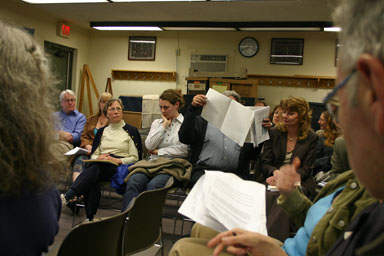
Residents examine and discuss Ellis Hollow water proposals.
Mary Ann also reports on last Tuesday's Conservation Board meeting, which focused on discussion of an alternative energy ordinance.
Better Housing presents, collects ideas
Better Housing for Tompkins County gave a presentation on Tuesday night in Etna looking at housing issues, and the challenges of creating housing people can afford in Tompkins County. Turnout was light - there were three attendees and three Better Housing folks - but it included a lot of back and forth, and I think the conversation was useful both for the attendees and for Better Housing.
They started with a quiz on the challenges of housing locally and the effects that housing has on people and the community. Then they gave a presentation which explored some of those questions, and then it got more complicated: they asked us for our concerns about affordable housing, and then asked us what would ease those concerns.
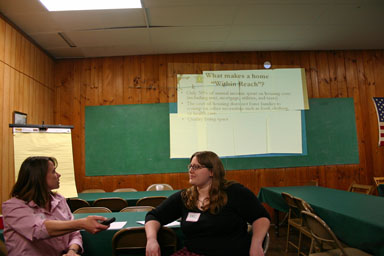
Stacey Crawford and Abi Munro present on affordable housing.
The three concerns we came up with were 'traffic', 'density,' and 'intended use/residents'. After a lot of discussion it seemed that we came to a few conclusions:
Some problems - like traffic, drainage, and sewage - can be helped by planning and design of roads, transit, and related systems.
Some problems relate to who will be living there. Senior citizens, for instance, are much less likely to be rowdy than younger residents.
The degree of the property owner's involvement is crucial. If a property is owner-occupied, the owner has a stake in the property, and seems less likely to cause problems. A good landlord who is actively involved in managing the property can similarly help. An absentee landlord is the worst of all possible situations, as they just take money out of the property while putting as little as possible in, and don't pay much attention to their tenants. (And to make things more complicated, a good landlord can sell to an absentee landlord and vice-versa.)
It was a good evening. They'll be having another of these meetings on Thursday, May 25th, also from 6:00pm to 7:30pm, at the Dryden Town Hall (map).
May 15, 2006
Area development, NYSEG fight
This morning's Ithaca Journal is quiet about Dryden, but has two stories that definitely affect Dryden residents. There's an article on Tompkins County Area Development, which reviewed its work at its annual meeting. TC3 was among a number of area beneficiaries.
There's also an article on the continuing feud between NYSEG and the New York State Public Service Commission over a new power rate plan. After reading it - and NYSEG's related advertising, I'm left with the conclusion that I trust NYSEG far less than the PSC.
It's an Ithaca story, but Dryden Town Board member Dan Tier is quoted extensively in his capacity as an Ithaca fireman in an article about fire in Cornell Heights that took a student's life.
May 16, 2006
School votes today, noon to 9:00pm
This morning's Ithaca Journal includes an editorial summarizing school board elections today. Dryden schools have a vote on the budget and referendums and an uncontested race for the board, while Ithaca schools have a budget vote, a few spending referendums, and six people running for three seats.
If you live in the Dryden school district, voting is at the High School/Middle School on Route 38. If you live in the Ithaca City School District, voting location varies by where you live:
If you live in election district 1 or 5 (meaning you vote at Etna Fire Station in regular elections), the parts of the Ithaca district east of Baker Hill Road, you vote at Northeast Elementary School (map).
If you live in election district 4, which includes Varna, Hanshaw Road from Ithaca to Route 13, and the area between Game Farm and Turkey Hill Roads, you vote at the Varna Community Center (map).
If you live in election district 8, the south side of Ellis Hollow Road over Snyder Hill to Route 79 and Bethel Grove (and normally vote at Bethel Grove Church), you vote at the Belle Sherman Annex (map).
If you live in election district 9, the north side of Ellis Hollow Road, Ellis Hollow Creek, Ringwood Road, and many other smaller roads there, then you vote at Caroline Elementary School (map).
Fall Creek cleanup, Newman golf course
It's been a busy day, and this morning's Journal included more Dryden-relevant news than just the school board elections.
There's an article on the Fall Creek Watershed Committee's annual cleanup of Fall Creek, both in Ithaca at Ithaca Falls and in Dryden near the Route 13 crossing and NYSEG. Dryden resident and Planning Board member David Weinstein, who lives right near the creek in Varna, is quoted in the article.
On the opinion page, Kerry Nivison of Freeville argues that the City of Ithaca should keep Newman Golf Course.
May 17, 2006
School budgets pass; disc golf at TC3
This morning's Ithaca Journal reports that every school budget in the county except Lansing's passed yesterday. In Dryden, Jeff Bradley, Brian June, and Brad Rauch were elected to the school board unopposed, while in Ithaca, Carol Warshawsky, Deboran O'Connor, and Jay True were elected.
TC3 now has a frisbee golf course, The 18-hole course takes about two hours to play, as players move from basket to basket. It's the first 18-hole course in the area. At the end of September, the course will host the New York State Disc Golf Championship.
Briefly in Tompkins reports on the TC3 graduation speaker. Alumnus, television production teacher, and comedy writer Dan Devlen will speak at Thursday night's ceremonies.
In county news, the legislature set a 2.7% tax levy increase as its budget goal this year, while a state audit of Industrial Development Agencies found flaws, including in Tompkins. (The full report is available (413KB PDF).)
Les Roberts drops out of Congressional race
The Utica Observer-Dispatch is reporting that Les Roberts has dropped out of the congressional race, leaving Michael Arcuri as the last remaining Democrat, no longer likely facing a primary.
May 19, 2006
TC3 graduates 615
This morning's Ithaca Journal reports on last night's TC3 graduation (in the print edition only), where 615 people received Associate's Degrees. Among the graduates the Journal spoke with is Amanda Christofferson, who graduated in a year after taking classes at Dryden High School which were dual-credit at TC3.
The Journal also reports on hope for the Village of Dryden's "sewage saga", Resources for Communities and People Solutions (RCAP) now seems to be helping the Village sort through the regulatory and funding process for its proposed new sewage treatment plant, and they're going to set up an outflow monitor at the old treatment plant to try to get a number for the inflow, with which they can sort out the long-standing Cortland Road Sewer District questions with the Town. The Journal concludes:
Movements on both these fronts will mean that the village will have a new sense of momentum behind a project that's been stumbling forward for years. The sewage treatment plant is at capacity, and until it is upgraded, the village cannot expand its sewer service and is simultaneously worrying about the aged system's ability to perform.
In county news, Democrat Peter Meskill announced that he will run for another term as Sheriff.
May 20, 2006
Paving along the northern edge; alien invaders
This morning's Ithaca Journal includes a look at summer road construction, and it looks like Dryden gets off fairly easily. The state will be resurfacing Route 34B from Caswell Road to Route 38, and for drivers headed to McLean or beyond to Cortland, McLean-Cortland Road will be getting reconstruction from now through 2007.
Tomorrow, Wildflower Appreciation Day at Six Mile Creek will include discussion of invasive plant species, You can find out more about these aliens in a draft report from Friends of Six Mile Creek.
Briefly in Tompkins notes that the Town Highway Department's scrap-metal collection will continue through the end of May.
On the opinion page, Daniel Cole of Freeville asks "how is an act of intolerance toward homosexuals any different than an act of intolerance against another race?"
Windmill tour
I didn't manage to get to it, but Town Board member Mary Ann Sumner reports on a tour of Caroline windmills the Planning Board and Town Board took on Thursday.
May 22, 2006
Recognizing a Dryden volunteer
Somehow I missed a story in Saturday's Journal, one I'd definitely like to see get attention. Dryden resident and Cornell student Jessica Houle received a Community Action Award from Tompkins Community Action for her work mentoring kids at Congers Mobile Home Park, where she grew up:
Houle works with the kids of Conger's Mobile Home Park through the OURS program — Opportunity, Understanding, Respect and Success — to expose them to new experiences through the arts, wilderness survival, cultural foods and hip hop dancing. She says the most important thing these kids need is an adult mentor who will be stable for them and encourage them, something many of them can't find in their families.
More on the Six Mile Creek invasion
This morning's Ithaca Journal visits the Six Mile Creek Wildflower Appreciation Walk, which this year was mainly about problems with invasive species taking over large areas and blocking out other plants.
There's also an announcement for tonight's presentation on the Village of Dryden historic district, sponsored by the Dryden Town Historical Society. It'll be at the Dryden Village Hall (map) at 7:00pm tonight, and refreshments will be served.
May 23, 2006
Full house at Historic District presentation
The Dryden Town Historical Society filled the second floor of Dryden Village Hall last night for its 25th annual meeting. After elections for trustees, Bob Watros introduced a new Historical Society publication, More than Names in Bronze, which looks at the lives of the men from Dryden who went to World War II and died while fighting it.
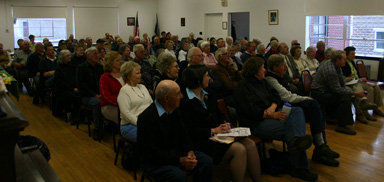
Crowd at historical society event.
The main presentation looked at the houses in the Village of Dryden which are on the National Register of Historic Places, both in the district in the southeast corner of the village and the seven buildings listed separately. Architect Elise Johnson-Schmidt, who as an architecture student had participated in the amazingly detailed 1983 Survey of the Village of Dryden and drawn its illustrations, spoke both about that experience and about her current and past work with historic preservation and the New York State Register.
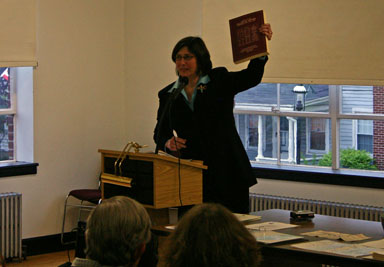
Corning architect Elise Johnson-Schmidt shows off the village architectural survey.
Next, Gina Prentiss presented each of the houses, calling on owners if they were present and taking comments and questions on houses from Johnson-Schmidt and the audience. There aren't a lot of 'just plain houses' in the area - every house had a story or a detail of some kind.
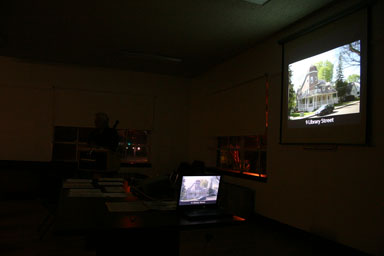
Gina Prentiss talks about 9 Library Street.
I was amazed to see that room fill for a discussion of old houses. Johnson-Schmidt doubted she would have had that size crowd in Corning, with its 11,000 people, and it's very clear that Dryden residents are interested in the buildings we've inherited from the past.
May 24, 2006
Asphalt prices to determine road paving
This morning's Ithaca Journal looks at the challenge of paving roads on a fixed budget when asphalt prices keep climbing:
As major consumers of oil, which is used to create asphalt, highway departments have been heavily hit by increasing prices for the commodity....
[Town of Dryden Highway Superintendent] Bush said he has a list of 10 other roads that could get paved this year but that he will have to wait to see how asphalt prices play out before knowing if they can afford to do the work. Projects that don't get done this year will likely become a priority next year, he said.
Like many other superintendents, Bush said his department is pushing to get work done early in the season before oil prices spike mid-summer and then will try to re-evaluate asphalt prices in August to determine if any more projects can be completed before snow arrives.
In Dryden Town Talk, Cathy Wakeman looks at a key transportation advantage in the Village of Dryden:
One of the luxuries of village life is the ability to hop on a bike and access most of life's necessities. All of my children, including the four-year-old, can navigate their way to the library, post office, grocery store and the four or so blocks to the doctor's office.
Wakeman visits with Dryden Family Medicine, a key part of that collection of bike-able services, which has just added two doctors. Wakeman also notes the rummage sale coming June 2nd and 3rd at the Dryden United Methodist Church.
Also in bicycling, Briefly in Tompkins notes that the Ithaca Tompkins County Transportation Council (ITCTC) is working on a draft map for bicyclists using county and state roads, indicating their suitability for bikes, and will have a meeting about their draft tomorrow night from 6:00pm to 8:00pm at the Old Jail (map) in downtown Ithaca.
Another Briefly in Tompkins focuses on Dryden, and lists:
A Better Housing for Tompkins County workshop "to freely discuss the future of homes within reach and the need for affordable housing in the community." The workshop will be tomorrow, Thursday, May 25th, from 6:00pm to 7:30pm, at the Dryden Town Hall (map). I went to an earlier one and found it excellent - they're not just presenting, but also listening.
Cortland County Soil and Water Conservation will have a Pasture Walk May 31st at 10:00am at the Jerry Dell farm in Dryden .
Dryden Dairy Day will be June 10th, with a parade on Main Street and booths at Montgomery Park. Registration deadlines for exhibitors are coming up soon!
The Dryden Youth Commission has an opening for another member.
The Highway Department continues to take scrap metal through May 31st at its garage (map).
A Bethel Grove man received ten years in prison for a drug-dealing conviction, and the Ithaca school board decided not to reduce grades for absences.
Retiring Congressman Sherwood Boehlert is pushing again for higher gas mileage standards. I went looking at new cars to see what kind of mileage I could hope for in a replacement for my 10-year-old Saturn sedan, which was 25 city/35 highway and got 39 miles to the gallon in its early days. No one seems to make small stationwagons any more, and the smallest pickup trucks are still huge. (Between political signs, the house, and the garden, I need cargo capacity.) Nothing in those categories seems capable of 30mpg. I wish Boehlert luck, and really hope automakers get their act together before my Saturn finally decides it's time to retire.
A closer look at the bike map
Earlier this morning I noted the work of the Ithaca Tompkins County Transportation Council (ITCTC) on a draft map for bicyclists indicating the suitability of various roads in the county for bicycling. Here's a closer view of the portion of their map (1.9MB PDF) for Dryden.
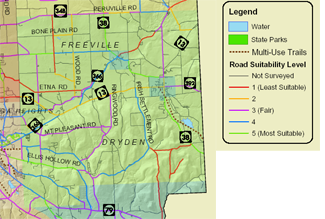
Draft map for bicycle suitability in Dryden.
You can click on that map for a larger image, which is probably a good idea.
I'm still getting started in bicycling, but I guess I have to wonder about the "average" cyclist in the map criteria (91KB PDF), at least for the stretch of 366 I ride. True, the speed limit is supposed to be 45mph, and the shoulders are usually wide, but there are also passing zones, unpredictable shoulder use for driveways, narrower sections, oversize loads, and the always cheerful concrete and gravel trucks. Add to that heavy traffic during the time periods the ITCTC seems most likely to want to encourage bicycle traffic, and I'm not particularly convinced it deserves a rating of 4, comparable to Irish Settlement or Snyder Hill Roads. Maybe with some bicycle signs and markers in the shoulders?
See what you think about the other roads, too.
I can't make it to tomorrow night's meeting, from 6:00pm to 8:00pm at the Old Jail (map) in downtown Ithaca, but hopefully other people interested in bicycles can.
May 25, 2006
County presents on Natural Features Focus Areas
On Tuesday night, the Tompkins County Planning Department gave a presentation on their Natural Features Focus Areas project at the McLean Fire Hall. I'd guess thirty people were there.
The session examined eight of the fifteen focus areas, mostly wetlands in the northeast of the county. All of the areas in Dryden, except for The Forest Lands in the southeast of town, were included:
Airport Ponds and Wetlands (344KB PDF)
Wetlands Upland Forest (491KB PDF)
Owasco Inlet (534KB PDF)
The Fens (741KB PDF)
Fall Creek (741KB PDF)
Cascadilla Creek (560KB PDF)
Six Mile Creek (636KB PDF)
Visitors signed in and staffers asked them which areas they were interested in. The Fens, Fall Creek, and Owasco Inlet were the subjects of most interest by far, not too surprisingly given the meeting's being in McLean. Planner Kate Hackett then gave a presentation summarizing the Planning Department's approach and the eight areas (those above plus Salmon Creek in Lansing) under discussion at the meeting.
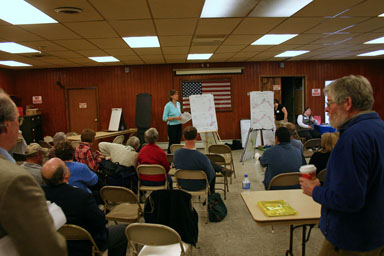
County Senior Planner Kate Hackett presents the Natural Features Focus Areas.
The Planning Department is interested in nine benefits natural areas provide:
After the presentation, there was a break for food and for exploring the many displays groups had set up, including the Cayuga Lake Watershed Network, Tompkins County Soil and Water Conservation District, Finger Lakes Land Trust, the Cayuga Trails Club, and Cooperative Extension.
After the break we re-grouped in smaller discussions around particular focus areas. I went to the one on Fall Creek (since I live across the street from the area). Concerns seemed to focus on flooding and debris issues, contamination of well and surface area from manure and septic systems, questions about municipal maintenance of natural streams and artificial ditches, and various natural invaders, from beavers returning to their natural habitat to deer and geese populations climbing to invasive plants.

Talking after the small groups.
The county seemed very interested in collecting information and ideas, not just telling us what their plans were, and people seemed to have a lot to share. They said they'd be posting meeting notes eventually as well.
(Town Board member Mary Ann Sumner visited an earlier session like this and posted her thoughts.)
How much land does Cornell own?
One of the interesting features of the County's presentation on Natural Features Focus Areas was the maps for their Education and Research sections in various areas. I'd always known that Cornell owned lots of land in the areas around Varna and Ellis Hollow, but I'd never seen it mapped this explicitly:
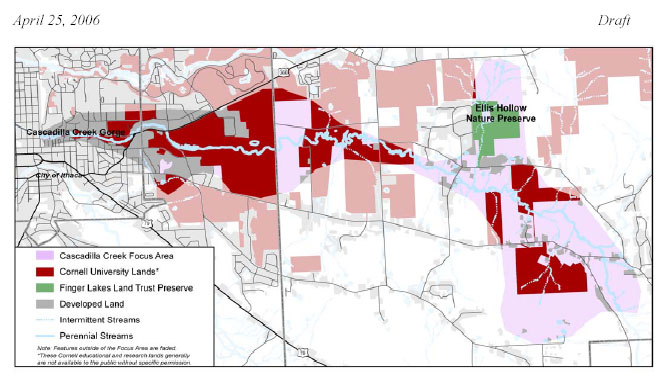
Cornell properties between Varna and Ellis Hollow, in red and pink.
Everything outside of the Cascadilla Creek Natural Features Focus Area (560KB PDF) is dimmed, so the Cornell-owned properties come in solid red (for land Cornell owns inside the focus area), lighter red (for land Cornell owns outside the focus area), and darker gray (for the main campus to the east of the focus area). Add to this the large chunk of land Cornell owns between Route 366 in Varna and Route 13, and that's a huge amount of territory.
(The map is wrong about one thing - much of this land is open to public use through Cornell Plantations. It'd be nice to see those properties marked separately from research or other land marked no trespassing. They also seem to be missing a few parcels, like the Cornell Statutory Fleet Garage.)
Planning Dryden school lunches
This morning's Ithaca Journal has a long article on the Dryden schools' school lunch task force, looking at what students are buying, what the force recommends, and nutrition guidelines.
There's a report on a roast held for departing radio show host Casey Stevens, who's been broadcasting his morning show from WHCU on Hanshaw Road for many years.
In politics, Sheriff Peter Meskill will have at least one opponent this year, retired Ithaca Police investigator Brian Robison.
May 26, 2006
Sheriff's race opens
There isn't much Dryden news in today's Journal, but there is a fair amount of county news worth exploring.
Former Ithaca investigator Brian Robison announced his run for sheriff yesterday, running as a Republican against two-term incumbent Democrat Peter Meskill.
(The Journal doesn't ever seem to report on political party happenings, but Meskill received the endorsement of the Tompkins County Democratic Committee last night, as did County Clerk Aurora Valenti, State Supreme Court candidate Elizabeth Garry, Assemblywoman Barbara Lifton, and Congressional candidate Michael Arcuri.)
The county also hired a new deputy administrator, Paula E. F. Younger, after a long selection process.
The Journal's editorial (which is weirdly formatted in the print edition) urges the county to give tax relief on gas prices, arguing that:
there are many families for whom $90 can break the budget, and these are not the people to forsake because you have a righteous grudge against the oil barons and the politicians they control.
While I agree with the Journal that I'd like to help the people who need to to have that $90, keeping gas prices low keeps those same people vulnerable when prices go up next time. We're not discovering oil the way we used to, and worldwide demand is climbing.
Cheap gas makes it a better option to find cheap housing way out of town, where there aren't a lot of nearby services, and drive all over. When gas prices climb again - as I have too much confidence they will - this kind of 'relief' isn't going to help the people who were saving money by making that choice.
There are much better ways to help people whose budgets are in danger of being broken than to lower the price of gasoline for everyone. If the state was actually interested in helping them, they might well have done that instead of tinkering with the gas tax, and the county would do better to look for ways to help the people who really need help.
May 27, 2006
Endorsement reporting
The Ithaca Journal, never a paper to shy from controversy, calls their article on Democratic endorsements Dems endorse Valenti for fifth term as county clerk. Valenti got lots of praise at Thursday's meeting for the excellent work she's done, but it's also the only race in this year's election where Democrats and Republicans are likely to endorse the same candidate. (Valenti is, I believe, a Republican.) Meanwhile, endorsements in contested races, notably those for Congress in the 24th district and for sheriff, get buried in a paragraph at the bottom of the story.
I really hope to see a parallel article titled "Republicans endorse Valenti for fifth term as county clerk" when they do their endorsements, with the same structure. I also hope to see an article on Valenti and the work she's done nearer the election, as her generally non-political work and that of the people she oversees is often taken for granted.
There's a letter from Martha Ferger of Dryden supporting changing the name of the library to "The Martin Luther and Coretta Scott King Library".
Finally, if you have scrap metal lying around, the Dryden Highway department will be collecting metal through May 31st at its garage (map).
Adding potatoes and an herb spiral
The garden work has slowed down a little as planting season comes to an end. We planted lots of trees, including plum, hazelnut, birch, poplar, maple, and chestnut, but work on major changes to the overall landscape has slowed down for a while. Over the last week or so, though, Josh made two substantial additions to the garden: three rows of potatoes and an herb spiral.
There are three varieties of potatoes, each in a row: Cranberry Red, Kennebuck, and Keuka Gold, a local potato variety. The potatoes went into the old vegetable garden, which has good soil and a neutral pH. (We'd thought about planting the three sisters of corn, squash, and beans, but maybe next year.)
The herb spiral didn't take Josh that long to assemble, but it was a huge transformation from what had been a mound in the center of the garden. Walking out of my back door, it's about twenty feet directly to this, which seems likely to be the productive centerpiece of the house garden:
The herb spiral, inspired by the one described in Gaia's Garden, is densely planted with herbs, their location on the spiral determined by their needs for sun and water. In a space just five feet in diameter, there are lots of little microclimates. The herbs here include pineapple sage, lemon thyme, german thyme, chervil, parsley, mountain mint, garlic chives, basil, salvia, purple sage, munstead lavender, summer savory, golden oregano, marjoram, and rosemary. Now I just need to use all these herbs!
I've posted a gallery of photos if you'd like to see more of how this was assembled.
Memorial Day events in Dryden
On Monday, the Village of Dryden will be having a Memorial Day parade at 10:00am on Main Street, followed by a service at 11:00 at the Village Green (map).
May 30, 2006
No trash-burning citations issued
It's been a quiet Memorial Day weekend for Dryden in the Ithaca Journal. At the county level, the news is also quiet: no citations issued for trash burning since the new rules banning most burning went into effect.
On the opinion page, Jay Gallagher writes about the ways the environment gets twisted into New York's budget process.
State politics blogging from the New York Times
I've always wished the New York Times would devote more of its reporting resources to Albany, and I seem to have gotten part of my wish. They now have Empire Zone, a weblog devoted to politics in the Empire State. It's been very busy the past few days covering the State Democratic Convention, and hopefully they'll keep reporting when the conventions have been rolled up and the votes cast.
May 31, 2006
How to cut a record; farm equipment on roads
Most of the Dryden-related news in today's Ithaca Journal is in Briefly in Dryden, which reports:
The band Thousands of One, part of the I-Town Collective, which just released a new CD, will talk about:
their composition process, rehearsal techniques, CD recording process and grassroots public relations work. Select students will also be invited to perform for and with Thousands of One.
The event will take place next Wednesday, June 7th, at 6:00pm at the Dryden Central School Auditorium, with a concert at 7:00pm.
Dryden Dairy Day will be June 10th, with a parade on Main Street and booths at Montgomery Park. Registration deadlines for exhibitors are coming up soon!
The Dryden Youth Commission has an opening for another member.
The Highway Department continues to take scrap metal through 2:30pm today at its garage (map).
On the opinion page, Debbie Teeter of Cooperative Extension suggests how best to deal with farm equipment on the road.
Try driving slowly
The headline of this piece may surprise people who know me, as I'm not known for my patience or my careful observance of speed limits. However, a motorcycle flying down Route 366 just reminded me of an experience I had a few weeks ago while driving through Varna. I was stuck behind a tractor that was going about 15 or 20 miles an hour, and as usual, that was a bit frustrating.
After a few moments, though, I realized I could actually see what I was driving through. At 15mph, you're not nearly as worried about watching the four hundred yards directly in front of you, and can actually look around a bit. It's not like walking, but it's a much more interesting experience than just driving at full speed.
Sometime when you're not in a hurry and there's no one behind you, give it a try. I'm guessing that half the speed limit is a reasonable speed to try, taking the advice of the engineers who designed the road and applying their advice in a slightly different way. See how much more you can see around you, and how much less concerned you need to be about deer, squirrels, and other cars turning ahead of you.
You do, of course, need to keep an eye on the rear-view mirror, but if everyone tried this, that might be less of a problem.
(Debbie Teeter's article on farm machinery on roads this morning offered this slow driving as a benefit, but it's easier to accept if you get to choose when it happens.)

